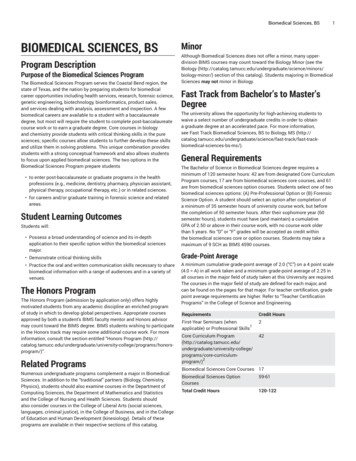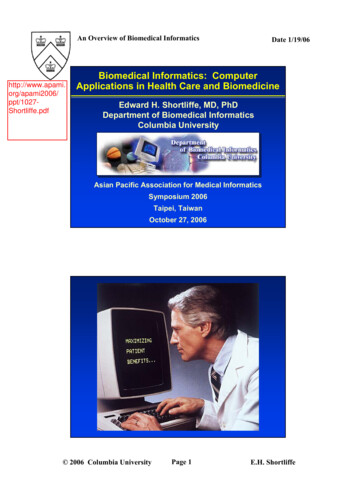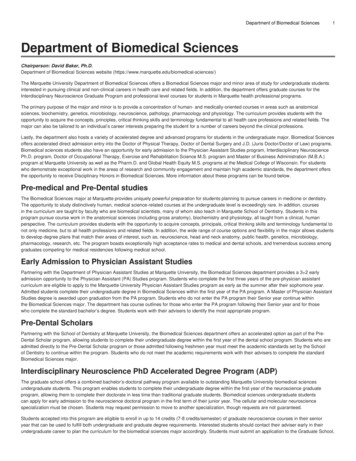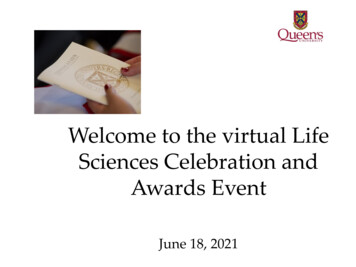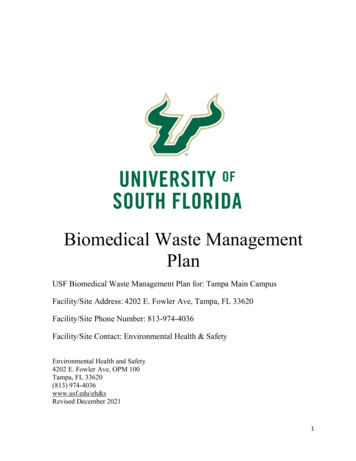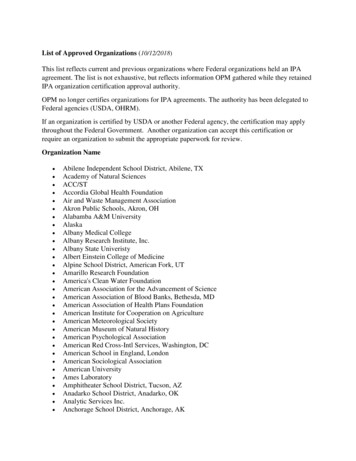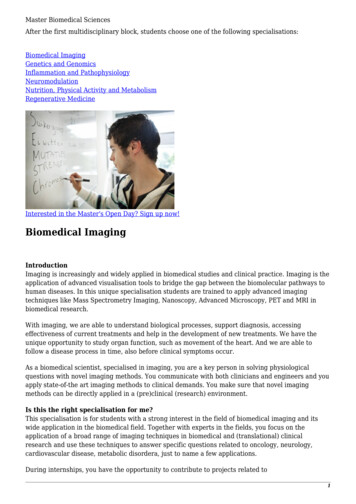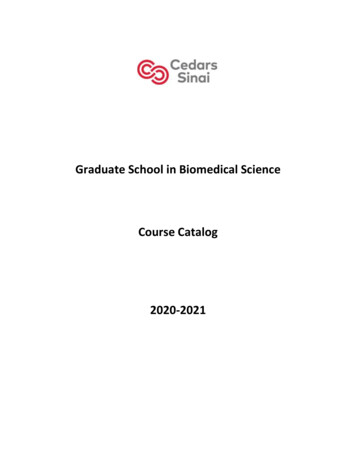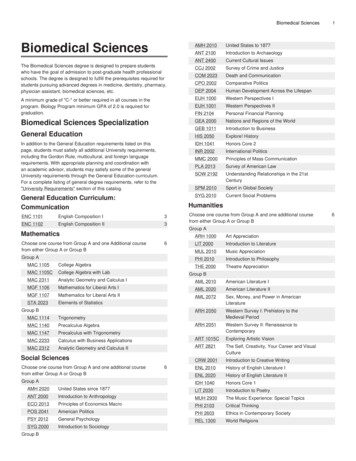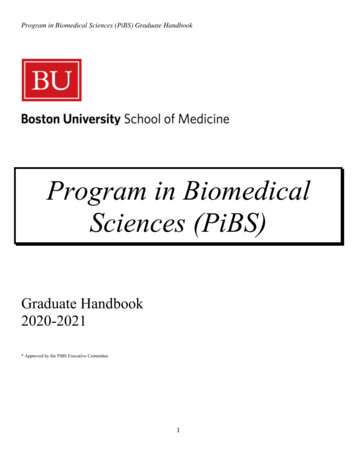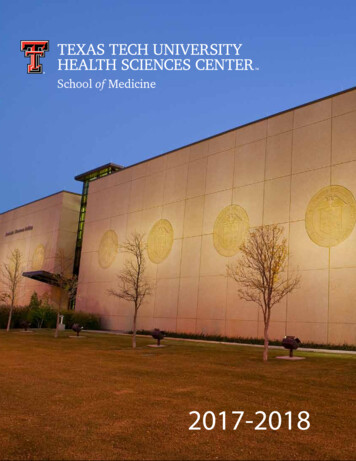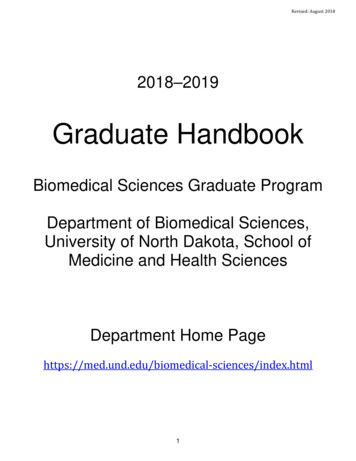
Transcription
Revised: August 20182018–2019Graduate HandbookBiomedical Sciences Graduate ProgramDepartment of Biomedical Sciences,University of North Dakota, School ofMedicine and Health SciencesDepartment Home html1
Revised: August 2018TABLE OF CONTENTSWELCOME LETTER3UNIVERSITY RESOURCES42018-2019 ACADEMIC CALENDAR5GENERAL GUIDELINES FOR GRADUATE STUDIES6PROGRAM DESCRIPITON6PROFESSIONAL DEVELOPMENT6PROFESSIONALISM7MASTER’S PROGRAM: MISSION, GOALS AND OBJECTVES8DOCTORATE PROGRAM: MISSION, GOALS AND OBJECTIVES8-9MASTER OF SCIENCE DEGREE REQUIREMENTS10CURRICULUM FOR MASTER’S DEGREE11DOCTORAL DEGREE REQUIREMENTS12BASIC CURRICULUM FOR DOCTORAL DEGREE13MICROBIOLOGY AND IMMUNOLOGY SUB-PLAN14NEUROSCIENCE SUB-PLAN15STUDENT TEACHING GUIDELINES16ELECTIVE COURSES (BIOMEDICAL SCIENCES)17-19FACULTY RECOMMENDED TEXTBOOKS19-20ASSESSMENT OF STUDENT PROGRESS20ANNUAL STUDENT REPORTING20-21LABORATORY ROTATIONS AND ADVISOR SELECTION22COMPREHENSIVE EXAMINATION GUIDELINES23LEAVE OF ABSENCE GUIDELINES24-26FORMS AND EVALUATION DUE DATES26-272
Revised: August 2018WELCOMEI would like to take this opportunity to welcome you to our graduate program within the Department ofBiomedical Sciences here at the University of North Dakota in the School of Medicine and Health Sciences.We are very excited that you chose to join our program for your graduate studies. In as much, we will makeevery effort to make this a beneficial and enjoyable experience while you are here on campus. To help you getbetter acquainted with our program I am sending you this handbook that describes Departmental andUniversity policies of importance with regards to our MS and PhD programs. I understand that the handbookmay raise more questions than answers, but rest assured we will go over these guidelines during orientationweek.While every attempt has been made to ensure that the policies described in this handbook are accurate, it isimportant to understand that the UND School of Graduate Studies (http://graduateschool.und.edu/) will havethe most up-to-date information on regulations and requirements for the graduate program and graduation.This handbook should be used as a resource for program guidelines and specific program information, but notas a substitute for the advising and counseling functions of your individual research supervisor, the GraduateDirector and the UND School of Graduate Studies.It is our hope that you will have a rewarding academic experience here at UND, and we are committed tohelping you achieve your career goals. If you have any questions, feel free to contact me by phone or email.Sincerely,Thad A. Rosenberger, Ph.D.Associate Professor in the Department of Biomedical SciencesUniversity of North Dakota, School of Medicine and Health Sciences504 Hamline Street, Room 122, Stop 9061Grand Forks, North Dakota 58203Director of Graduate Program in Biomedical SciencesSenior Associate Editor for Lipids, A Journal of the American Oil Chemists’ SocietyOffice: (701) 777-0591Lab: (701) 777-0590Email: thad.rosenberger@med.und.edu3
Revised: August 2018UNIVERSITY RESOURCESUND, School of Graduate Studieshttp://graduateschool.und.edu/Twamley Hall, Room 105264 Centennial Drive, Stop 8178Grand Forks, ND 58202Toll Free: 1-800-Call-UNDLocal: 701-777-2784Office of International ter/prospective-students/index.cfmMemorial Union, Room 261Phone: 1-701-777-4231International Centre2901 University Avenue, Stop 7109Grand Forks, ND 58202-7109United States of AmericaUND Student Financial Aid x.cfmTwamley Hall, Room 216Tel: 701-777-1234FAX: 701-777-2040264 Centennial Drive Stop 8371Grand Forks, ND 58202-8371Student Health lth/McCannel Hall, Room 100.Phone: 701-777-45002891 2nd Ave N Stop 9038Grand Forks, ND 58202-9038SMHS Wellness AdvocateMichelle Montgomery, MSWSchool of Medicine and Health Sciences, Room E272Phone: 701-777-54851301 N Columbia Road Stop 9037Grand Forks, ND 58202-90374
Revised: August 20185
GENERAL GUIDELINES FOR GRADUATE STUDENTSRevised: August 20181. Graduate students are normally provided with a stipend for work within the Program in the form ofgraduate research or teaching assistantship. Continued financial assistance is dependent onacceptable performance in research, teaching, and academics as demonstrated by annual reviews.2. Each graduate student is required to participate in teaching activities during their tenure as graduatestudents in the Program. The specific teaching activities will be determined in accordance with theneeds of the Department in meeting its educational mission. Teaching is an important part of graduateeducation. Therefore, teaching excellence and professionalism are expected from students in theProgram.3. Every graduate student is required to present a research seminar each academic year, beginning in thefall semester of Year 2, until completion of their degree. A meeting of the Student Advisory Committeenormally will follow research seminars.4. Graduate school is considered a full time job. Although no record of hours worked is required, it isunlikely that a 40-hour work week will be sufficient to be successful in graduate school and your futurescientific career.5. Seminars and journal clubs are an important part of the academic experience. Graduate students areexpected to attend seminars and journal clubs, to be on time for such meetings, and to behave in aprofessional manner.6. Graduate school is the beginning of your professional career. Therefore, professional conduct isexpected of all graduate students in the Program.PROGRAM DESCRIPTIONThe Biomedical Sciences Graduate Program at the University of North Dakota School of Medicine and HealthSciences emphasizes applied research and scholarship in the biomedical sciences. Research and educationalopportunities within the program provide students with focused training in multiple fields including Inflammationand Infectious Disease, Neuroscience, or Molecular and Cellular Biology.The goal of our graduate program is to educate students in a rigorous and challenging environment that fosterscreativity, innovation and discovery. MS, PhD, and MD/PhD degrees are offered which can be customized tothe career goals of the individual student.PROFESSIONAL DEVELOPMENTSuccess in graduate school and career requires that you create a plan, take advantage of resources andopportunities to develop skills, and explore career resources and alternatives. The first step in the process isto develop an Individual Development Plan (IDP) focusing on your immediate and long-term career objective,discuss these objectives with your academic advisor, then maintain “on file” a continually evolving IDP with theGraduate Director. Secondly, there are many local resource opportunities to facilitate your professionaldevelopment including our Biomedical Graduate Student Organization (BGSA), North Dakota Academy ofSciences, and opportunities to serve on Medical School and Department committees. Other local professionaldevelopment activities include participation in our Frank Low Research Day Conference, our Annual GraduateStudent Retreat, the School of Graduate Studies sponsored GRAD conference, annual three-minute-thesiscompetitions, student teaching opportunities, and University and Local support for travel to national andinternational scientific conferences. Other professional development opportunities include active engagementin national and international professional societies, local, private, and national fellowship competitions, anddissemination of ideas through peer- and non-peer reviewed publication. The Graduate Program encouragesall students to engage in as many professional development activities as is possible and places an emphasison supporting local professional development activities and publication.6
Revised: August 2018PROFESSIONALISMThe Biomedical Sciences Graduate Program at the University of North Dakota School of Medicine and HealthSciences recognizes that while knowledge and technical skills are crucial in a biomedical science career, themanner in which they are used is equally important. In addition to competence in their field, all biomedicalprofessionals must strive to develop and retain those qualities that constitute the essence of professionalism.The core of professionalism includes the attributes of commitment to excellence, honesty and integrity,compassion, respect for others, and professional responsibility. These qualities apply to all aspects ofprofessional life including interactions with colleagues and coworkers.Below you will find example of behaviors that can serve as indicators of professionalism. Although notexhaustive, the following list provides guidance for students and all those responsible for their education.Commitment to excellence Strives to exceed expectations at all times; Commits to life-long learning by taking responsibility for one’s own learning and accurately reflecting onthe adequacy of one’s knowledge, skill development, and personal barriers to accomplishing learningand growth; Takes responsibility for learning in group settings by being present, prepared, and engaged; Strives for mastery of learning appropriate for one’s level of training; Reflects with colleagues on the success of group work.Honesty and integrity Communicates appropriately in an honest and timely manner; Accurately represents actions and events; Avoids cheating, plagiarism, fabrication, falsification, misrepresentation of the truth; Reflects on one’s personal reaction to encounters with others and accepts responsibility for personalactions; Recognizes, appropriately discloses, and manages conflicts of interest; Is forthcoming with information, does not withhold and/or use information for power; Admits mistakes.Compassion Recognizes and responds to the fears and anxieties of others including colleagues; Assists colleagues in dealing with the challenges of professional work.Respect for others Recognizes and respects personal and sexual boundaries; Avoids bias (e.g. gender, race, age, sexual orientation) in interactions with others; Articulates and embraces the many positive aspects of difference among people and demonstratesawareness of how such differences affect personal interactions; Demonstrates a commitment to resolving conflicts in a collegial manner; Shows sensitivity and respect for the needs, feelings, ideas, and wishes of others in professional andeducational settings; Demonstrates humility in interactions with others; Recognizes that appropriate dress and appearance demonstrate respect for others and for theprofession.Professional responsibility Is present and punctual for scheduled activities; Takes responsibility to notify others for unavoidable absence or tardiness; Copes with the challenges, conflicts, and ambiguities inherent in professional work; Identifies and appropriately deals with problematic behaviors of oneself and colleagues; Adheres to established professional codes of conduct; Identifies ethical issues in professional situations and acts in an ethical manner.7
Revised: August 2018MS PROGRAM MISSION STATEMENTThe mission of the Biomedical Sciences Graduate Program leading to the Master of Science degree is toprepare students for careers in education or technical careers in biomedical sciences.MS PROGRAM GOALS AND OBJECTIVESGoal 1: Students will possess and be capable of applying knowledge in biomedical sciences related totheir field of study.Objective 1.1: Students will demonstrate a breadth of knowledge in the biomedical sciences to supportscholarly inquiry and flexibility in their career path.Objective 1.2: Students will demonstrate a depth of knowledge in elected subject areas through scholarlycontribution to their field of study.Objective 1.3: Students will demonstrate skills in the use of technology to manage information.Objective 1.4: Students will demonstrate the ability to use primary literature and other resources to supporttheir scholarly efforts.Goal 2: Students will demonstrate the ability to understand, develop, and apply multiple approaches totest ideas using the scientific method.Objective 2.1: Students will be able to apply the scientific method to conduct a scholarly investigation.Objective 2.2: Students will demonstrate an ability to formulate questions and generate hypotheses inresponse to new and unfamiliar problems.Objective 2.3: Students will demonstrate an ability to implement experimental approaches that have beenappropriately chosen to test their hypotheses.Objective 2.4: Students will demonstrate the ability to appropriately and accurately collect, record, and analyzeresearch data.Objective 2.5: Students will demonstrate the ability to reach scientifically sound conclusions based on currentknowledge within their field of study.Goal 3: Students will master communication skills necessary to convey the results of their scholarlywork.Objective 3.1: Students will demonstrate the ability to present their research clearly, concisely, and accuratelyin both oral and written form to experts in the field and to the general scientific community.Objective 3.2: Students will demonstrate the ability to effectively communicate their scholarly work to a layaudience in a way that illustrates the accomplishments and importance of scientific research.Goal 4: Students will recognize and abide by professional and ethical standards and participate inservice to their institution, the scientific community, and society in general.Objective 4.1: Students will demonstrate the ability to establish rapport with colleagues and peers thatencourages a team-based mindset toward the accomplishment of departmental and institutional goals.Objective 4.2: Students will demonstrate the ability to articulate and abide by the standards of ethical behaviorand responsible conduct in research.Objective 4.3: Students will demonstrate the ability to articulate and abide by the acceptable standards ofconduct in the teacher-learner relationship.Objective 4.4: Students will engage in ongoing service to the department, the school, the university, theprofession, and the community.PhD PROGRAM MISSION STATEMENTThe mission of the Biomedical Sciences Graduate Program leading to the Doctor of Philosophy degree is toprepare students for professional careers in biomedical sciences through personalized and multi-disciplinarygraduate education and research experiences.8
PhD PROGRAM GOALS AND OBJECTIVESRevised: August 2018Goal 1: Students will become professionals who possess a foundational knowledge of the biomedicalsciences and are capable of applying that knowledge in scholarly endeavors as self-directed, life-longlearners.Objective 1.1: Students will demonstrate breadth of knowledge in the biomedical sciences to form a solid basisfor scholarly inquiry and flexibility in their career path.Objective 1.2: Students will demonstrate depth and integration of knowledge in specific subject areas of theirchoice to support their research and to allow them to make meaningful contributions that advance thediscipline.Objective 1.3: Students will demonstrate skills in managing information and searching the biomedical literatureand data repositories using appropriate technology.Objective 1.4: Students will remain current in their knowledge of major scientific developments and apply thisknowledge to multi-disciplinary problems.Goal 2: Students will become professionals who demonstrate intellectual curiosity and the ability toconduct meaningful scholarly inquiry.Objective 2.1: Students will demonstrate the ability to develop clearly stated meaningful hypotheses andresearch questions that lead to scientific investigation in areas relevant to the biomedical sciences.Objective 2.2: Students will demonstrate the ability to select, design, and implement experimental approachesto rigorously test their hypotheses.Objective 2.3: Students will demonstrate the ability to appropriately and accurately record and to analyze datawith the degree of rigor expected by the scientific community.Objective 2.4: Students will demonstrate the ability to reach scientifically sound conclusions by integrating theirdata with existing knowledge and by critical evaluation of their results.Objective 2.5: Students will disseminate their findings through peer-reviewed publications and other meansthat advance knowledge in their discipline.Goal 3: Students will master communication skills necessary to convey the results of their scholarlywork.Objective 3.1: Students will demonstrate the ability to present their research clearly, concisely, and accuratelyin both oral and written form to experts in the field and to the general scientific community.Objective 3.2: Students will demonstrate the ability to effectively communicate their scholarly work to a layaudience in a way that illustrates the accomplishments and importance of scientific research.Goal 4: Students will gain experience in education and mentorship.Objective 4.1: Students will demonstrate the ability to teach biomedical science to a precollege, undergraduate,graduate, or health professional audience.Objective 4.2: Students will demonstrate the ability to provide formative and summative feedback thatencourages, assesses, and improves learning.Objective 4.3: Students will demonstrate the principles of effective mentorship.Goal 5: Students will recognize and abide by professional and ethical standards and participate inservice to their institution, the scientific community, and society in general.Objective 5.1: Students will demonstrate the ability to establish rapport with colleagues and peers thatencourages a team-based mindset toward the accomplishment of departmental and institutional goals.Objective 5.2: Students will demonstrate the ability to articulate and abide by the standards of ethical behaviorand responsible conduct in research.Objective 5.3: Students will demonstrate the ability to articulate and abide by the acceptable standards ofconduct in the teacher-learner relationship.Objective 5.4: Students will engage in ongoing service to the department, the school, the university, theprofession, and the community.9
MASTER OF SCIENCE DEGREE REQUIREMENTSRevised: August 2018Students seeking the Master of Science degree in the Biomedical Sciences Graduate Program must satisfy allgeneral requirements set forth by the School of Graduate Studies as well as particular requirements set forthby the Biomedical Sciences Graduate Program. In addition to course work, the MS degree requirescompletion of an acceptable thesis in a program of study designed by the student with Faculty AdvisoryCommittee approval.1. A minimum of 30 credit hours of graduate level courses including research and thesis.2. Completion of the following core graduate courses:a. BIMD 501 – Scientific Discovery I - 6 creditsb. BIMD 510 – Basic Biomedical Statistics – 2 credits*c. BIMD 516 – Responsible Conduct in Research – 2 creditsd. BIMD 590 – Research – at least 8 creditse. BIMD 998 – Thesis – 4 credits*BIMD 510 – Basic Biomedical Statistics fulfills the scholarly tool requirement.3. Completion of a minimum of 4 credit hours of graduate level elective courses.4. A student must obtain at least a “B” in all required courses in order to remain in good standing in thegraduate program. If less than a “B” is received, the student will be given the opportunity to remediate in amanner determined by the course director. If remediation is unsuccessful, the student may petition theGraduate Faculty to take the course a second time. In the event that the student is unable to raise thegrade to at least a “B”, the student must petition the Graduate Faculty to be allowed to remain the program.5.6. Students must maintain a minimum 3.0 GPA in accordance with School of Graduate Studies guidelines(UND Graduate and Undergraduate Academic Catalog).In addition to course work, the Master of Science degree requires completion of a thesis based scholarlyproject completed by the graduate student under the guidance of a faculty advisor. It is expected that theresults of the scholarly work will be publishable in a peer-reviewed journal.10
Revised: August 2018MASTER’S CURRICULUM (BASIC)Year 1FallMinimum credits8Spring8SummerThroughout Year3BIMD 501 Scientific DiscoveryBIMD 516 Responsible Conduct in ResearchBIMD 502 Scientific Discovery IIBIMD 510 Basic Biomedical StatisticsBIMD 5903 Laboratory RotationsJournal ClubTotal credits19Year 2FallMinimum credits6Spring6SummerThroughout Year3-6BIMD Elective(s)BIMD590: ResearchBIMD Elective(s)BIMD590: ResearchBIMD590: ResearchResearch Seminars (Faculty and Student)Journal ClubTotal CreditsYears 3-4FallSpringSummerThroughout yearCredits62623Credits0-40-60-40-63-615-18Minimum credits663-6BIMD590: ResearchBIMD590 and/or 598: Research and/or ThesisBIMD590 and/or 598: Research and/or ThesisResearch Seminars (Faculty and Student)Journal ClubTeaching requirement (See Note Below)Total creditsCredits663-615-18 30Total credits needed for degreeNote: Teaching requirement can be completed once required elective courses are complete11
Revised: August 2018DOCTORAL DEGREE REQUIREMENTSStudents seeking the PhD degree in the Biomedical Sciences Graduate Program must satisfy all generalrequirements set forth by the School of Graduate Studies as well as particular requirements set forth by theBiomedical Sciences Graduate Program. In addition to course work, the PhD degree requires completion of anacceptable dissertation in a program of study designed by the student with Faculty Advisory Committeeapproval.1. A minimum of 90 credit hours of graduate level courses including research and dissertation.2. Completion of the following graduate level courses:a. BIMD 501 – Scientific Discovery I - 6 creditsb. BIMD 502 – Scientific Discovery II - 6 creditsc. BIMD 510 – Basic Biomedical Statistics – 2 credits*d. BIMD 516 – Responsible Conduct in Research – 2 creditse. BIMD 518 – Grant Writing – 2 creditsf. BIMD 590 – Research – at least 50 creditsg. BIMD 999 – Dissertation – 6 credits*BIMD 510 – Basic Biomedical Statistics fulfills the scholarly tool requirement.3. Completion of a minimum of 6 credit hours of graduate level elective courses.4. A student must obtain at least a “B” in all required courses in order to remain in good standing in thegraduate program. If less than a “B” is received, the student will be given the opportunity to remediate in amanner determined by the course director. If remediation is unsuccessful, the student may petition theGraduate Faculty to take the course a second time. In the event that the student is unable to raise thegrade to at least a “B”, the student must petition the Graduate Faculty to be allowed to remain the program.5. Students must maintain a minimum 3.0 GPA in accordance with School of Graduate Studies guidelines(UND Graduate and Undergraduate Academic Catalog).6. Students must successfully complete the comprehensive examination.7. Students must fulfill the teaching requirement as defined by the student’s Faculty Advisory Committee.8. Research and Dissertation: The PhD degree requires completion of a dissertation based on the results ofa project completed by the graduate student under the guidance of a faculty advisor. The project mustrepresent an original and independent investigation by the student. It is expected that the student willpublish at least one first author peer-reviewed manuscript in a scientific or academic journal prior to thedefense of their dissertation. The dissertation prepared by the candidate must be presented orally in apublic forum and defended before the Faculty Advisory Committee and the Departmental Graduate Facultyand will be open to all members of the academic community.12
Revised: August 2018PhD CURRICULUM (BASIC)Year 1FallMinimum credits8Spring8SummerThroughout Year3BIMD 501 Scientific Discovery IBIMD 516 Responsible Conduct in ResearchBIMD 502 Scientific Discovery IIBIMD 510 Basic Biomedical StatisticsBIMD 5903 Laboratory RotationsJournal ClubTotal credits19Year 2FallMinimum credits6Spring6Summer3-6Throughout YearBIMD 518 Grant WritingBIMD Elective(s)BIMD590: ResearchBIMD Elective(s)BIMD590: ResearchBIMD590: ResearchComprehensive ExaminationResearch Seminars (Faculty and Student)Journal ClubTotal CreditsYears 3-4FallSpringSummerThroughout yearCredits20-40-40-60-63-615-18Minimum credits663-6BIMD590: ResearchBIMD590: ResearchBIMD590: ResearchResearch Seminars (Faculty and Student)Journal ClubTeaching requirement (See Note Below)Total creditsYear 5FallSpringSummerThroughout yearCredits62623Credits663-615-18Minimum credits666BIMD 590 ResearchBIMD 590 ResearchBIMD 999 DissertationResearch Seminars (Faculty and Student)Journal ClubTotal creditsTotal credits needed for degreeCredits66618 90Note: Teaching requirement can be completed once comprehensive exam is complete13
PhD CURRICULUM (MICROBIOLOGY AND IMMUNOLOGY SUBPLAN)Revised: August 2018A model course schedule for a student in the Microbiology and Immunology Specialization is shown below:Year 1FallMinimum credits8Spring8SummerThroughout Year3BIMD 501 Scientific Discovery IBIMD 516 Responsible Conduct in ResearchBIMD 502 Scientific Discovery IIBIMD 510 Basic Biomedical StatisticsBIMD 5903 Laboratory RotationsJournal ClubTotal credits19Year 2FallMinimum credits6Spring6Summer3-6Throughout YearBIMD 518 Grant WritingBIMD 530 Components of Immune SystemBIMD 531 Components of Microbial PathogenesisBIMD590: Research 5 credits from microbiology and Immunology subplanBIMD 532 Microbial Gene RegulationBIMD 533 Microbial Membranes and TransportBIMD 534 Microbial Structure/FunctionBIMD 535 Bacterial Host Pathogen InteractionsBIMD 536 Viral Host Pathogen InteractionsBIMD 537 Host Pathogen Inter Eukaryotic MicrobesBIMD 538 immunological DisordersBIMD590: ResearchBIMD590: ResearchComprehensive ExaminationResearch Seminars (Faculty and Student)Journal ClubTotal CreditsYears 3-4FallSpringSummerThroughout yearCredits2220-411111110-13-615-18Minimum credits663-6BIMD590: ResearchBIMD590: ResearchBIMD590: ResearchResearch Seminars (Faculty and Student)Journal ClubTeaching requirement (See Note Below)Total creditsYear 5FallSpringSummerThroughout yearCredits62623Credits663-615-18Minimum credits666BIMD 590 ResearchBIMD 590 ResearchBIMD 999 DissertationResearch Seminars (Faculty and Student)Journal ClubTotal creditsTotal credits needed for degreeCredits66618 90Note: Teaching requirement can be completed once comprehensive exam is complete14
PhD CURRICULUM (NEUROSCIENCE SUBPLAN)Revised: August 2018For students with an interest in the Neuroscience Specialization, the following course schedule is proposedto provide a comprehensive overview of the 5 sub-disciplines.Year 1FallMinimum credits8Spring8SummerThroughout Year3BIMD 501 Scientific Discovery IBIMD 516 Responsible Conduct in ResearchBIMD 502 Scientific Discovery IIBIMD 510 Basic Biomedical StatisticsBIMD 5903 Laboratory RotationsJournal ClubTotal credits19Year 2FallMinimum credits6Spring6Summer3-6Throughout YearBIMD 518 Grant WritingBIMD 520 Principles of NeuroanatomyBIMD 521 NeurophysiologyBIMD 522 Principles of NeuropharmacologyBIMD 523 Neurochemical Basis of the NervousSystemBIMD 524 Neurodegenerative Diseases andPathophysiologyBIMD590: ResearchComprehensive ExaminationResearch Seminars (Faculty and Student)Journal ClubTotal CreditsYears 3-4FallSpringSummerThroughout yearCredits2222223-615-18Minimum credits663-6BIMD590: ResearchBIMD590: ResearchBIMD590: ResearchResearch Seminars (Faculty and Student)Journal ClubTeaching requirement (See Note Below)Total creditsYear 5FallSpringSummerThroughout yearCredits62623Credits663-615-18Minimum credits666BIMD 590 ResearchBIMD 590 ResearchBIMD 999 DissertationResearch Seminars (Faculty and Student)Journal ClubTotal creditsTotal credits needed for degreeCredits66618 90Note: Teaching requirement can be completed once comprehensive exam is complete15
Revised: August 2018Student Teaching GuidelinesPhD candidates in the graduate program of biomedical sciences are required to complete a minimum of 2credit hours of student teaching. An average of 10 hours a week time commitment should be expected of thestudent, this includes time in class and time spent preparing for class/grading. Students funded by thedepartment and thus designated as GTAs by the graduate school should not be expected to TA more than onelab/lecture section per semester.Note: Some teaching opportunities require more than 2 credit hour minimum commitment.Teaching options available:Microbiology Lab2 Credit Hour Minimum CommitmentAnatomy Lab4 Credit Hour Minimum Commitment2 Credit Hours Shadowing2 Credit Hours as Lead Teaching AssistantAdvanced Biochemistry Lab2 Credit Hour Minimum CommitmentUnder Specific request:Undergraduate LectureBIMD 501/502 LectureMedical School LectureOther teaching arrangements can be made with instructor permission and must be approved by advisor andgraduate student director.Note: Students are not expected to meet their teaching requirement during their first and second years in theprogram and should complete their comprehensive examination requirements before beginning studentteaching.Expectations for each teaching opportunity position should be written by the instructor prior to the beginning ofthe semester and reviewed by their faculty advisor to ensure they are kept as consistent as possible. Theseexpectations should be available to students as they are researching the different teaching opportunities.Students who are teaching should be aware that they will be expected to continue making progress towardcompletion of their dissertation research. Students choosing to teach beyond the minimum teachingrequirements must get approval from their Faculty Advisory Committee and the graduate program director.Eval
The mission of the Biomedical Sciences Graduate Program leading to the Master of Science degree is to prepare students for careers in education or technical careers in biomedical sciences. MS PROGRAM GOALS AND OBJECTIVES Goal 1: Students will possess and be capable of applying knowledge in biomedical sciences related to their field of study.
